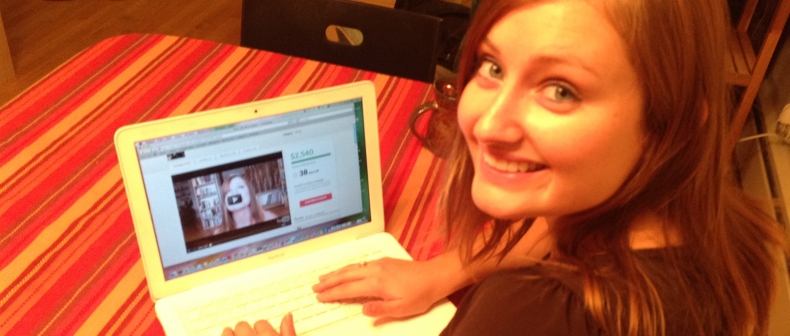
Author Courtney Symons shows off her IndieGoGo campaign, which raised more than $3000.
It’s the story of three people: a man named Jeremy and his two young kidnapping victims, a brother and sister named Violet and Ben. Jeremy is neither mean nor violent. He’s not someone you can hate. The psychological thriller explores the relationship between the kidnapper and the kidnapped before, during, and after the yearlong abduction. It’s the story of their bond, how they cope and how they change.
That’s the plotline for Ottawa-based technology reporter turned author Courtney Symons’ debut novel Once, We Were Stolen. After she was unable to secure a literary agent, she made the decision to publish the story herself as an e-book and launched an IndieGoGo campaign to help fund the project. She exceeded her goal of raising $2,000 to hire an editor and a graphic designer by 50 per cent and is now planning to not only release an independent e-version, but also print 100-200 hard copies that will be made available in local bookstores in Ottawa.
“I had a story inside me I needed to tell,” she says. “ I saw people reading e-books on the bus, saw the potential for the technology, and thought it would be a great way to get a start.”
Bestselling American crime novelist Sue Grafton created controversy this summer when she said self-published authors are, “too lazy to do the hard work.” And while British author Adam Croft told The Guardian these claims were “outrageous,” Grafton’s thoughts are echoed across the industry by traditional authors who claim indie writers aren’t willing to pay the dues required to make it. Authors such as Grafton claim that in order to be an author, you need to face the rejection she faced when publishers didn’t pick up her first three novels. She calls self-published authors “wannabes.”
But let’s be honest here. Indie writing is facing the same stigma independent filmmakers and musicians used to (and sometimes still do) face: that if your work were any good, you’d have a publisher.
Symons disagrees. She says talent is more important now than ever before. Now, anyone can submit a manuscript at the click of a button. Publishers are receiving so many manuscripts that the good get lost with the bad. Symons says authors need to do more to stand out. She created a social media campaign surrounding her book’s funding initiative, from Twitter accounts to videos to its own website. “It was a dream I wouldn’t have been able to actualize otherwise,” she says.
In this month’s issue of Elle Canada, author Vakis Boutsalis says indie publishing just may follow in the footsteps of industries where independent creators no longer depend on traditional backing to find success. He doesn’t so much suggest it as he does announce it. “When the time comes — and it is coming,” he says, “the question won’t be ‘How was the book released? But is the book any good?’”
Already there are parallels. After winning a coveted Rolling Stone contest, Saskatoon’s the Sheepdogs became the first unsigned act to grace the cover of the iconic magazine. The band was scooped up by Atlantic Records shortly after. Incidentally, this is what happened with E. L. James’s Fifty Shades of Grey series. Breathy novels written over the span of hours, initially self-published as an e-book have since sold beyond a record-breaking 10 million copies worldwide. Author Amanda Hocking was offered a two million dollar publishing deal after self-publishing 17 teen paranormal romance novels. Canadian director Terri Tatchell has optioned one of Hocking’s trilogies for film.
The trend here for publishers is to let the consumer decide. Independent success is then an easy, bankable investment. For indie writers, it’s that rejection is fuel. Self-publishing creates a more tangible desire to potentially find mainstream success. Though that is every author’s dream, this isn’t often the case. Elle Canada writer Boutsalis self published his novel Fishbowled, but admits he’d only sold 15 copies at the time of his article.
That’s why Symons says the time is here for indie writers to make things happen for themselves. And really, it does work much like the shifting music industry. Symons created her IndieGoGo campaign to generate awareness about her project. “I realized I had nothing to lose,” she says. She predicted more of the funding would come from crowdsourced strangers, but found it almost entirely came from people within her network — friends, family and colleagues. Her fans.
She invested in editor Ellen Keeble, a Calgary-based Sun Media reporter who also provides editing services. They’re currently working through Symons’ fourth draft, which may lead to a fifth and a sixth, she doesn’t know yet. As soon as the editing is finished, Symons plans to release the e-book through avenues such as Amazon and Apple who take a cut of the profits, but let authors keep the rights to their books.
An article in Forbes explores the relationship between rejection and talent. It highlights John Kennedy Tool; an author whose great American novel A Confederacy of Dunces was rejected so many times he committed suicide at age 31. Then contrasts it with modern examples such as Hugh Howey, a science fiction writer who sold more than 200,000 copies of his self-published novella Wool in the U.S. alone. Director Ridley Scott has optioned it for a film.
Howey told Forbes, “Tell me this: why is self-publishing antithetical to ‘honing one’s craft?’ … What’s wrong with testing the waters? Instead of wasting one’s time writing query letters, why not work on that next manuscript instead?”
Musicians are doing it. Filmmakers are doing it. Hell, comedians are doing it. So why can’t writers do it? There’s nothing worse than untold stories sitting in digitally dusty computer folders.
____
Sheena Lyonnais writes for Toronto Standard. You can follow her on Twitter at @SheenaLyonnais.
For more, follow us on Twitter @TorontoStandard or subscribe to our newsletter.














